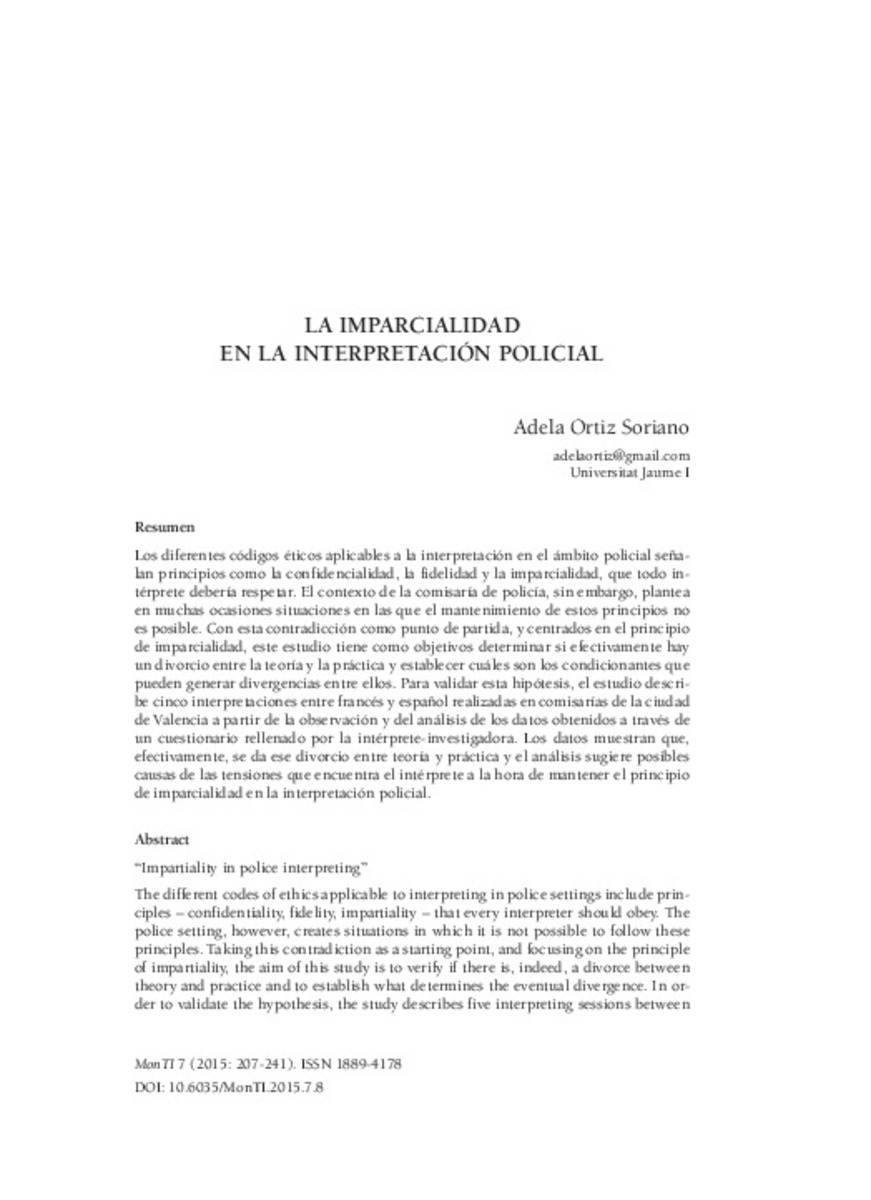Mostrar el registro sencillo del ítem
La imparcialidad en la interpretación policial.
| dc.contributor.author | Ortiz Soriano, Adela | |
| dc.date.accessioned | 2016-02-10T09:07:52Z | |
| dc.date.available | 2016-02-10T09:07:52Z | |
| dc.date.issued | 2015 | |
| dc.identifier.issn | 1889-4178 | |
| dc.identifier.issn | 1989-9335 (electrònic) | |
| dc.identifier.uri | http://hdl.handle.net/10234/149385 | |
| dc.description.abstract | Los diferentes códigos éticos aplicables a la interpretación en el ámbito policial señalan principios como la confidencialidad, la fidelidad y la imparcialidad, que todo intérprete debería respetar. El contexto de la comisaría de policía, sin embargo, plantea en muchas ocasiones situaciones en las que el mantenimiento de estos principios no es posible. Con esta contradicción como punto de partida, y centrados en el principio de imparcialidad, este estudio tiene como objetivos determinar si efectivamente hay un divorcio entre la teoría y la práctica y establecer cuáles son los condicionantes que pueden generar divergencias entre ellos. Para validar esta hipótesis, el estudio describe cinco interpretaciones entre francés y español realizadas en comisarías de la ciudad de Valencia a partir de la observación y del análisis de los datos obtenidos a través de un cuestionario rellenado por la intérprete-investigadora. Los datos muestran que, efectivamente, se da ese divorcio entre teoría y práctica y el análisis sugiere posibles causas de las tensiones que encuentra el intérprete a la hora de mantener el principio de imparcialidad en la interpretación policial. | ca_CA |
| dc.description.abstract | The different codes of ethics applicable to interpreting in police settings include principles – confidentiality, fidelity, impartiality – that every interpreter should obey. The police setting, however, creates situations in which it is not possible to follow these principles. Taking this contradiction as a starting point, and focusing on the principle of impartiality, the aim of this study is to verify if there is, indeed, a divorce between theory and practice and to establish what determines the eventual divergence. In order to validate the hypothesis, the study describes five interpreting sessions between French and Spanish that took place at different police stations in Valencia. The data were collected by means of a questionnaire filled in by the interpreter-researcher. The results show that there is in fact a divorce between theory and practice and the analysis suggests the possible causes behind the tensions that the interpreter encounters when trying to keep the principle of impartiality in police interpreting. | ca_CA |
| dc.format.extent | 35 p. | ca_CA |
| dc.format.mimetype | application/pdf | ca_CA |
| dc.language.iso | spa | ca_CA |
| dc.publisher | Universitat Jaume I | ca_CA |
| dc.publisher | Universitat de València | ca_CA |
| dc.publisher | Universitat d' Alacant | ca_CA |
| dc.relation.isPartOf | MonTI, 2015, núm. 7 p. 207-241 | ca_CA |
| dc.rights | © d’aquesta edició: Universitat d’Alacant, Universitat Jaume I, Universitat de València | ca_CA |
| dc.rights.uri | http://creativecommons.org/licenses/by/4.0/ | * |
| dc.subject | papel del intérprete | ca_CA |
| dc.subject | interpretación policial | ca_CA |
| dc.subject | imparcialidad | ca_CA |
| dc.subject | invisibilidad | ca_CA |
| dc.subject | códigos éticos | ca_CA |
| dc.subject | interpreter’s role | ca_CA |
| dc.subject | police interpreting | ca_CA |
| dc.subject | impartiality | ca_CA |
| dc.subject | invisibility | ca_CA |
| dc.subject | codes of ethics | ca_CA |
| dc.title | La imparcialidad en la interpretación policial. | ca_CA |
| dc.type | info:eu-repo/semantics/article | ca_CA |
| dc.identifier.doi | http://dx.doi.org/10.6035/MonTI.2015.7.8 | |
| dc.rights.accessRights | info:eu-repo/semantics/openAccess | ca_CA |
| dc.relation.publisherVersion | http://hdl.handle.net/10045/52546 | ca_CA |
Ficheros en el ítem
Este ítem aparece en la(s) siguiente(s) colección(ones)
-
MonTi_ 2015 _núm 7 [14]








